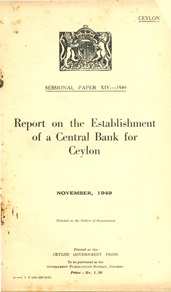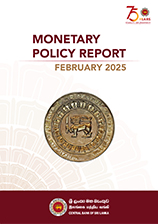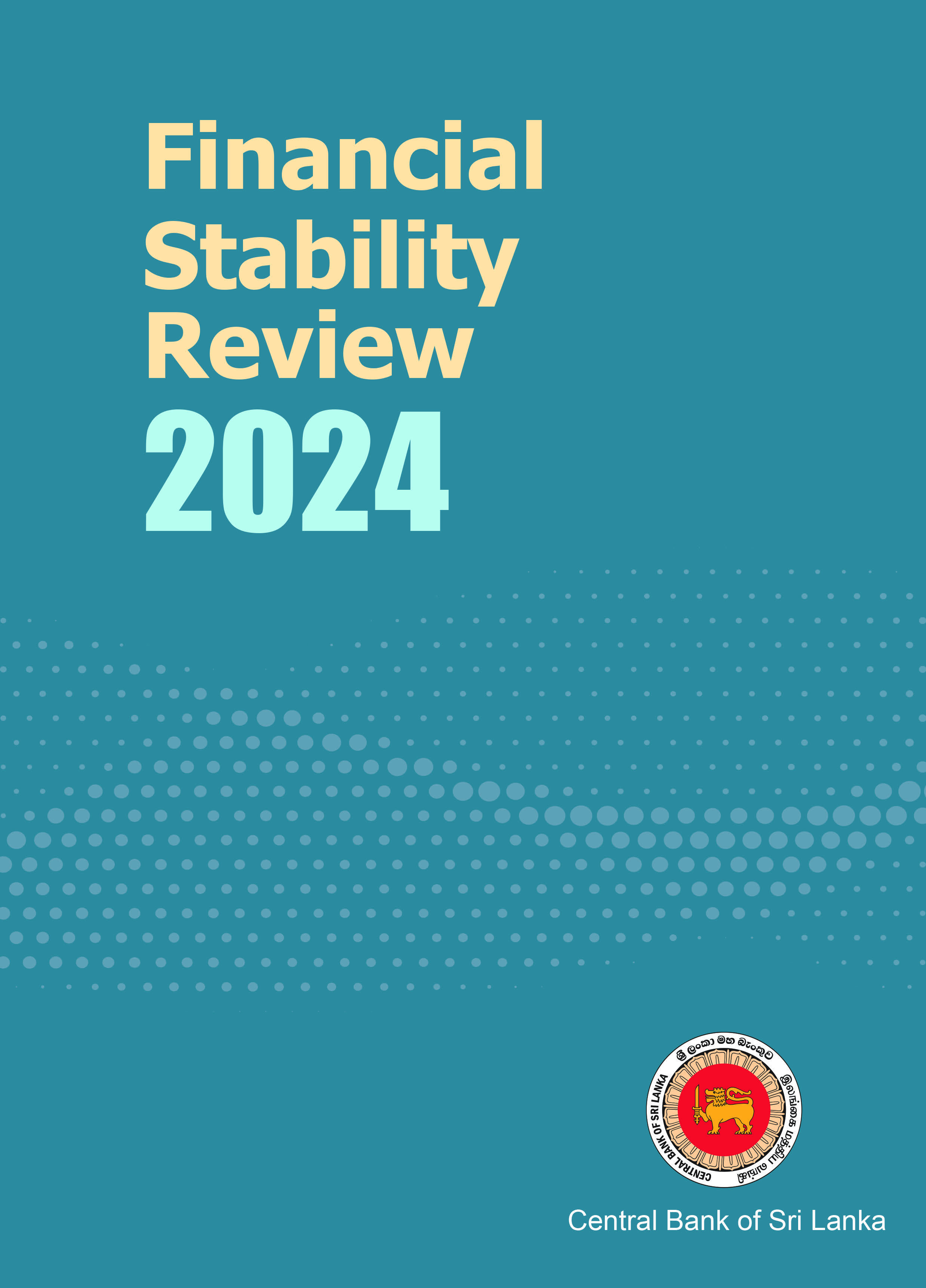The Central Bank of Sri Lanka today published “Recent Economic Developments: Highlights of 2022 and Prospects for 2023”. The publication can be downloaded via the Central Bank Website in Sinhala, Tamil and English languages.
-
The Central Bank publishes 'Recent Economic Developments: Highlights of 2022 and Prospects for 2023'
-
External Sector Performance - September 2022
Earnings from exports remained robust in September 2022, while import expenditure declined for the seventh consecutive month, on a year-on-year basis, reflecting the significant reduction in imports of non-food consumer goods and investment goods. As a result, the merchandise trade deficit recorded a notable contraction in September 2022, (y-o-y). Workers’ remittances increased marginally in September 2022, (y-o-y). Earnings from tourism recorded an increase in September 2022, compared to the same period in 2021. Foreign investment in the government securities market and the Colombo Stock Exchange (CSE) recorded a notable net inflow during September 2022. The Central Bank continued to provide forex liquidity to finance essential imports, exhausting the liquid level of gross official reserves.
-
CCPI based headline inflation recorded 66.0% in October 2022, reversing its continued increasing trend observed since October 2021
Headline inflation, as measured by the year-on-year (Y-o-Y) change in the Colombo Consumer Price Index (CCPI, 2013=100) which followed an increasing trend since October 2021, declined to 66.0% in October 2022 from 69.8% in September 2022. Following a similar trend, the Food inflation (Y-o-Y) decreased to 85.6% in October 2022 from 94.9% in September 2022, while the Non-Food inflation (Y-o-Y) decreased to 56.3% in October 2022 from 57.6% in September 2022.
-
Release of ‘Financial Literacy Survey Sri Lanka – 2021’ Publication
‘Financial Literacy Survey Sri Lanka - 2021’, a publication of the Central Bank of Sri Lanka, is now available for public access.
The Regional Development Department of the Central Bank of Sri Lanka, with the assistance of the International Finance Corporation (IFC) – under the IFC-DFAT Women in Work program – conducted the first ever countrywide Financial Literacy Survey in Sri Lanka, as part of the implementation of the National Financial Inclusion Strategy of Sri Lanka. The key objective of the survey was to assess the level of financial literacy across the population with a view to formulating appropriate policy measures.
The survey focused on the elements of knowledge, attitudes and behavior within the concept of financial literacy and this publication consists of the key survey findings.
-
NCPI based headline inflation recorded at 73.7% on year-on-year basis in September 2022
Headline inflation, as measured by the year-on-year (Y-o-Y) change in the National Consumer Price Index (NCPI, 2013=100) increased to 73.7% in September 2022 from 70.2% in August 2022. This increase in Y-o-Y inflation was driven by the monthly increases of both Food and Non-Food categories. Accordingly, Food inflation (Y-o-Y) increased to 85.8% in September 2022 from 84.6% in August 2022, while Non-Food inflation (Y-o-Y) increased to 62.8% in September 2022 from 57.1% in August 2022.
-
Sri Lanka Purchasing Managers’ Index - September 2022
In September 2022, Purchasing Managers Indices indicate marginal expansion for Services activities and contraction for Manufacturing activities.
Manufacturing PMI declined in September 2022, indicating a setback in manufacturing activities on a month-on-month basis.
Services PMI recorded an index value of 51.2 in September 2022 indicating a marginal expansion in the services sector.
-
Appointment of a New Deputy Governor
 The Monetary Board, with the concurrence of the Hon. Minister of Finance, has promoted Mrs. K M A N Daulagala, Assistant Governor and the Secretary to the Monetary Board, to the post of Deputy Governor of the Central Bank of Sri Lanka (CBSL) with effect from 07 October 2022.
The Monetary Board, with the concurrence of the Hon. Minister of Finance, has promoted Mrs. K M A N Daulagala, Assistant Governor and the Secretary to the Monetary Board, to the post of Deputy Governor of the Central Bank of Sri Lanka (CBSL) with effect from 07 October 2022.Mrs. K M A N Daulagala has over 31 years of service at CBSL in different capacities in the areas of supervision and regulation of non-bank financial institutions, macroprudential surveillance, finance, international operations, risk management, regional development, human resource management and training and development. She has served as the Chief Accountant and Director of Supervision of Non-Bank Financial Institutions and Financial System Stability and has contributed towards strengthening the legal framework and governance in the non-bank financial institutions sector. Prior to the appointment as a Deputy Governor, Mrs. Daulagala held the position of Assistant Governor and was in-charge of the Macroprudential Surveillance Department and the Centre for Banking Studies and served as the Secretary to the Monetary Board. She also served as Secretary to the Board Risk Oversight Committee, Monetary Board Advisory Audit Committee and the Ethics Committee.
-
External Sector Performance – August 2022
Import expenditure declined in August 2022, on a year-on-year basis, for the sixth consecutive month, despite recording an increase compared to July 2022. Considering the need to prioritise essential imports amidst shortage of forex liquidity, the Government tightened import restriction measures on non urgent imports during August 2022, which, however, were partially relaxed in September 2022. Meanwhile earnings from exports increased in August 2022 continuing its growth trend observed since April 2022. As a result, the merchandise trade deficit recorded a notable contraction in August 2022 compared to the previous year.
-
The Central Bank of Sri Lanka maintains policy interest rates at their current levels
The Monetary Board of the Central Bank of Sri Lanka, at its meeting held on 05 October 2022, decided to maintain the Standing Deposit Facility Rate (SDFR) and the Standing Lending Facility Rate (SLFR) of the Central Bank at their current levels of 14.50 per cent and 15.50 per cent, respectively. In arriving at this decision, the Board considered the latest macroeconomic conditions, expected developments and macroeconomic projections. The Board noted the tight monetary conditions prevailing at present, the decelerating pace of inflation, and the envisaged disinflation path in the near term supported by both domestic and global factors. The Board was of the view that the monetary conditions remain sufficiently tight to achieve the envisaged disinflation path in the period ahead. The contractionary fiscal policies would complement the effects of tight monetary policy measures already in place, helping to mitigate any build-up of aggregate demand pressures, thereby anchoring inflation expectations and bringing down headline inflation to the targeted level of 4-6 per cent over the medium term.
-
CCPI based headline inflation recorded at 69.8% on year-on-year basis in September 2022
Headline inflation, as measured by the year-on-year (Y-o-Y) change in the Colombo Consumer Price Index (CCPI, 2013=100) increased to 69.8% in September 2022 from 64.3% in August 2022. This increase in Y-o-Y inflation was driven by the monthly increases of both Food and Non-Food categories. Accordingly, Food inflation (Y-o-Y) increased to 94.9% in September 2022 from 93.7% in August 2022, while Non-Food inflation (Y-o-Y) increased to 57.6% in September 2022 from 50.2% in August 2022.










